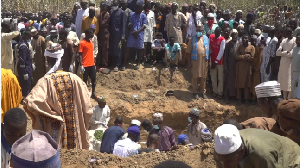 Di explosion happun Tuesday night
Di explosion happun Tuesday night
Nigerian farmer Mustapha Majiya still dey in shock sake of say im lose almost 50 members of im extended family dis week afta one fuel tanker explode.
"My nephews, Nuradeen Rabiu, 16, and Dini Babalo, 17, dey among pipo wey die. Dem try to stop pipo from getting too close to di tanker and fetching fuel bifor di explosion," di 50-year-old resident of Majia tell di BBC.
Di explosion on Tuesday night for di northern state of Jigawa don dey described as one of Nigeria most-deadly tanker accidents in recent years.
E don claim di lives of at least 153 pipo - many burnt beyond recognition. Of di 100 pipo wey wound for di inferno, several remain for hospital wit life-threatening injuries.
Di tanker bin dey full of petrol and bin dey travel on a main road through di town wey no get street lights wen di driver lost control as anoda vehicle approach.
Wen residents realise say free petrol dey, pipo wey be mostly young men and teenagers rush to get buckets and oda containers to fetch di precious liquid.
Ova di last 17 months, di price of petrol don increase for Nigeria - wia frequent fuel shortages dey and dey lead to a cost-of-living crisis.
Many residents of di farming community bin no wan give up di opportunity to stock up, ignoring di warnings from dose like Mr Majiya nephews, wey bin both dey for dia fourth year at di town secondary school.
"I just buy dem books and new uniforms for di term," e tok in disbelief.
Mr Majiya also lose a long-time friend, Jamilu Maigaji, for di explosion wey take place about one hour afta di tanker crash.
Di 55-year-old bin dey married wit two wives and 13 children and bin dey for di scene as pipo wan fetch fuel. Some of di fuel enta drainage ditch and some scrubland by di side of di highway.
"Some pipo just dey look and no understand di dangers of being around di scene," Mr Majiya lament.
As a devout Muslim, Mr Majiya say e accept God will as di giver and taker of life.
But na part of a broader pattern of tanker-related explosions and accidents for Nigeria, wey experts tink say e fit dey avoided if beta strategic planning and safety measure dey.
Petroleum products for Nigeria - a vast oil-producing kontri and Africa most-populous nation - dey mostly transported by road.
"E no get anywia for di world wia dem only rely on di roads to move goods. Di goment need to invest more in freight rails across di kontri," Urban developer Kola Ashiru-Balogun tell BBC.
For 2020 alone, more dan 1,500 accidents involving fuel tankers bin dey recorded, resulting in 535 deaths, according to the latest figures from di kontri Federal Road Safety Corps.
Just last month, 59 pipo die for Nigeria north-central Niger State afta one fuel tanker bin collide wit one lorry wey bin dey carry passengers and cattle.
As di emergency services bin dey respond to di Majia explosion, anoda fuel tanker overturn for Ibafo for south-western Ogun State.
Di tanker spill im contents in front of one commercial bank, and lead to explosion. Although no casualties bin dey reported, di incident bin cause significant damage to nearby vehicles and property.
Afta Tuesday night horrific accident, di Senate ask di National Orientation Agency, di body wey dey in charge of goment communication, to intensify efforts to make di public aware of di dangers of approaching tanker wey get accident.
Vice-President Kashim Shettima say: "As we deal wit dis tragedy, make we also reflect on di importance of safety measures and public awareness to prevent such incidents for future."
In fact last week im bin attend di launch of di National Road Safety Advisory Council (Narsac), wey aim to improve co-ordination across goment to enhance road safety and reduce crashes.
However, some safety experts tok say di issue no be about lack of policies but rather na failure to implement dem.
"Political will to act no dey,” Timothy Iwuagwu, president of di Institute of Safety Professionals of Nigeria, tell BBC.
E attribute many of di tanker-related accidents to factors such as poorly maintained roads, inadequately inspected vehicles and untrained drivers.
"Di force of di tanker hitting di ground no dey enough to cause explosion. Na di poor fabrication of dis tanks by unqualified pesins - na di problem be dat," e tok.
Overloaded tankers and ineffective safety checks for depots also play ogbonge role for how frequent dis accidents dey happun, e add.
But di reality on di ground na say desperate pipo go take risks.
Since President Bola Tinubu come to power for May 2023, im administration don scrap fuel and electricity subsidies, and dis one make petrol price to rise by more dan 500% and a significant spike in energy costs.
Meanwhile di naira, Nigeria currency, don depreciate by more dan 400% against di US dollar, and e further worsen di economic hardships.
Inflation stand at more dan 32%, and an estimated 104 million Nigerians - almost half of di population - live in poverty.
Di goment don defend dis measures and insist say dem dey necessary to stabilise di ailing economy.
And although di goment don promise investigation into di Jigawa explosion, history show say prosecutions dey rare - and victims or dia families rarely receive compensation.
"Di pipo wey dey left behind for Majia dey feel veri sorry afta dis incident," Mr Majiya tok as e dey reflect di town shock and grief.
“Di goment don promise to help di community and di survivors. We dey wait for dem,” e tok.
As the nation join dem to mourn, calls dey grow in volume for di goment to protect im citizens from dis preventable disasters.